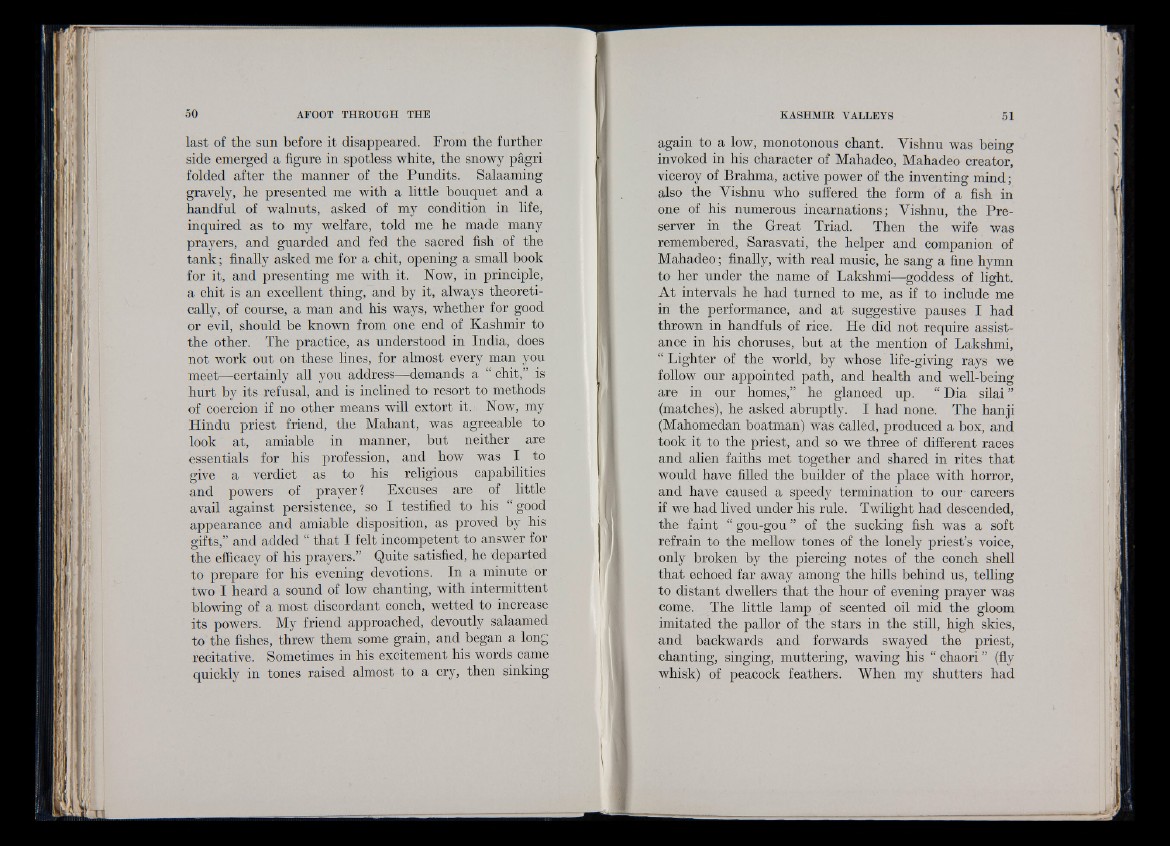
last of the sun before it disappeared. From the further
side emerged a figure in spotless white, the snowy pagri
folded after the manner of the Pundits. Salaaming
gravely, he presented me with a little bouquet and a
handful of walnuts, asked of my condition in life,
inquired as to my welfare, told me he made many
prayers, and guarded and fed the sacred fish of the
tank; finally asked me for a chit, opening a small book
for it, and presenting me with it. Now, in principle,
a chit is an excellent thing, and by it, always theoretically,
of course, a man and his ways, whether for good
or evil, should be known from one end of Kashmir to
the other. The practice, as understood in India, does
not work out on these lines', for almost every man you
meet—certainly all you address—demands a “ chit,” is
hurt by its refusal, and is inclined to resort to methods
of coercion if no other means will extort it. , Now, my
Hindu priest friend, the Mahant, was agreeable to
look at, amiable in manner, but neither are
essentials for his profession, and how was I to
give a verdict as to his religious capabilities
and powers of prayer ? Excuses are of little
avail against persistence, so I testified to his “ good
appearance and amiable disposition, as proved by his
gifts,” and added “ that I felt incompetent to answer for
the efficacy of his prayers.” Quite satisfied, he departed
to prepare for his evening devotions. In a minute or
two I heard a sound of low chanting, with intermittent
blowing of a most discordant conch, wetted to increase
its powers. My friend approached, devoutly salaamed
to the fishes, threw them some grain, and began a long
recitative. Sometimes in his excitement his words came
quickly in tones raised almost to a cry, then sinking
again to a low, monotonous chant. Vishnu was being
invoked in his character of Mahadeo, Mahadeo creator,
viceroy of Brahma, active power of the inventing mind;
also the Vishnu who suffered the form of a fish in
one of his numerous incarnations; Vishnu, the Preserver
in the Great Triad. Then the wife was
remembered, Sarasvati, the helper and companion of
Mahadeo ; finally, with real music, he sang a fine hymn
to her under the name of Lakshmi—goddess of light.
At intervals he had turned to me, as if to include me
in the performance, and at suggestive pauses I had
thrown in handfuls of rice. He did not require assistance
in his choruses, but at the mention of Lakshmi,
“ Lighter of the world, by whose life-giving rays we
follow our appointed path, and health and well-being
are in our homes,” he glanced up. “ Dia silai ”
(matches), he asked abruptly. I had none. The hanji
(Mahomedan boatman) was called, produced a box, and
took it to the priest, and so we three of different races
and alien faiths met together and shared in rites that
would have filled the builder of the place with horror,
and have caused a speedy termination to our careers
if we had lived under his rule. Twilight had descended,
the faint “ gou-gou ” of the sucking fish was a soft
refrain to the mellow tones of the lonely priest’s voice,
only broken by the piercing notes of the conch shell
that echoed far away among the hills behind us, telling
to distant dwellers that the hour of evening prayer was
come. The little lamp of scented oil mid the gloom
imitated the pallor of the stars in the still, high skies,
and backwards and forwards swayed the priest,
chanting, singing, muttering, waving his “ chaori ” (fly
whisk) of peacock feathers. When my shutters had